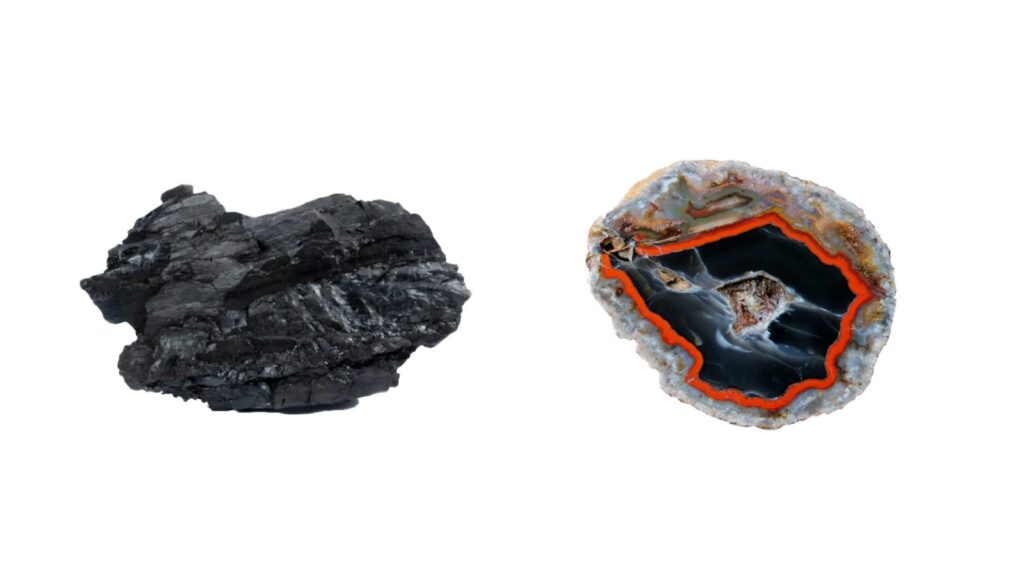A bill recently introduced in the Kentucky House aims to correct what one lawmaker calls an embarrassing mislabeling of the Commonwealth’s state rock and mineral.

Kentucky is commonly known as coal country. The fossil fuel was discovered in the state more than 250 years ago and the business of mining it is one of the region’s hallmark industries, and it’s been the state mineral for just over 25 years. There’s just one problem – geologically, it’s a rock.
But fixing the mixup isn’t a one-step solve. Democratic State Rep. Al Gentry – who completed a bachelor’s degree in geology at the University of Louisville and a master’s degree in hydrogeology at the University of Kentucky – said the substance currently identified as the state rock, Kentucky agate, is actually a mineral.
Not only that, but Kentucky agate doesn’t technically exist. It’s a colloquial name applied to chalcedony agate – the colorful quartz that can be found inside of rocks across the state, particularly in eastern Kentucky.

Gentry, who represents a portion of Jefferson County, introduced House Bill 378 late last month to correct this error. It was assigned to the chamber’s State Government committee on Feb. 7.
The state representative said he understands that the issue isn’t on everyone’s minds, but he feels that misnomer doesn’t look good for a state that takes pride in being a part of coal country.
“From an educational standpoint, it’s a bit of an embarrassment for us… But it’s something that is an easy fix,” he said. “There are two other states in the United States that recognize coal [as their state rock]. These are very heavy coal states – West Virginia and Utah – but they both honor coal as the state rock, not the state mineral.”
Gentry said he thinks the mistake came from a misunderstanding about coal being labeled as a mineral resource under Kentucky’s tax law.
Coal itself is considered an organic sedimentary rock in the field of geology while minerals fall under a separate classification. A mineral resource – like coal – can contain minerals but is not a mineral in-of-itself (i.e. gravel, limestone, sand).
The distinction between rock, mineral and mineral resources was not clear to the General Assembly in 1998, when the legislature officially designated coal as Kentucky’s state mineral. A Kentucky Geological Survey page about the designation alludes to a public petition launched by a group of Louisville students as the primary driver for legislators to make coal the state mineral. Kentucky Agate was honored with the title of state rock in 2000.
Some Kentucky geologists feel that the state has gotten a bad reputation for the mislabeling in the earth sciences field in the decades since these designations were made official.
Emily Johnson, an instructor in Murray State University’s Earth and Environmental Sciences Department, said the mixup is “a laughing point” in her university department and in some scientific circles around the country.
Johnson said she even remembers the subject coming up during an introductory meeting for a research internship at Mount Rainier National Park in Washington.
“I’ll never forget their park geologist was introducing me to some of these folks that I would be working with [and] one of them piped up and said, ‘Oh, you’re from Kentucky. That’s the backward state, right? You’re the ones that don’t know the difference between a rock and a mineral,’” Johnson said. “I thought everybody would think that just because they might have it wrong at the state level that we as upcoming geologists don’t know the difference ourselves.”
The Kentucky Geological Survey – which is a part of the University of Kentucky but has, at times, functioned as a part of state government – even mentions on their website that they were “not consulted” about the designations.
This isn’t the first time Gentry has fought for Kentucky to correct this mistake. The Louisville lawmaker has made similar proposals twice already in his legislative career – in 2019 and 2022. Neither measure saw a vote.
Gentry recalls, in 2019, facing concerns over whether his proposal would impact how Kentucky taxes coal, which is legally considered a mineral resource. Though Gentry said it would have no influence on tax dollars, the measure was tabled.
“One of the members [of the house] stood up and said something along the lines of ‘if we do this, that it might change our whole legal system or taxing system on coal’,” Gentry recalled. “Which is ridiculous. It wouldn’t have any bearing on that whatsoever.”
Gentry said, ultimately, this should be a simple correcting of the record for Kentucky’s scientific community.
“The only Kentuckian individuals that pay attention to this are probably in the geologic or mineralogical fields, but it’s something that it’s an easy fix. Let’s go on and fix it,” Gentry said. “We can all get a little chuckle out.”
This story is republished with permission from WKMS. Read the original.






